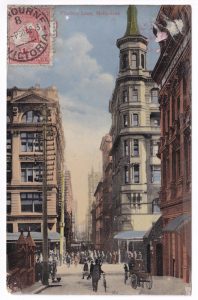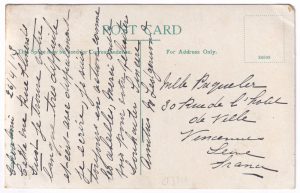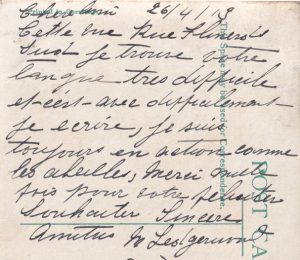[Editor: This postcard, which incorporates a photo of a Melbourne street scene, and which has a Kangaroo and Map stamp, is dated 26 April 1913 (postmarked 30 April 1913). The handwritten text is in French.]
[Front of postcard]
Flinders Lane Melbourne
[Description: A photograph of Flinders Lane (Melbourne), featuring some pedestrians and horse-drawn cabs.]
[Reverse of postcard]
[Handwritten text, in italics]
26/4/13
Chere Ann
Cette vue Rue Flinders La
Suol[?] je trouve votre
langue tres difficile
et c’est avec difficilement
je ecrire, je suis
toujours en action comme
le abeilles, merci mille
tres pour votre felicites
Souhaites sincere
Amitus M Les l geruvvd[?]
[Text is in French.]
[Addressed to:]
Mlle Puqueler
30 Rue de l’hotel
de Ville
Vincennes
Seine
France
[Information re the publisher or manufacturer:]
Printed in Germany.
24506
[No identifying information about the manufacturer was included on the postcard.]
Source:
Original document
Editor’s notes:
Dimensions (approximate): 88 mm. (width), 138 mm. (height).
An approximate translation of the handwritten text is as follows:
26/4/13
Dear Ann
This is a view of the street Flinders Lane.
I find your language to be very difficult and it is with difficulty I write.
I am always busy like the bees.
Thank you so very much for your congratulations.
Sincere wishes
Your friend Monsieur Les l geruvvd[?]
Note: Some trouble was experienced in transcribing, and therefore translating, the sign-off or signature on this post card (on the last line); it could be: l’gerurre, l’gerurre, l’geruvvd, or something else. Similarly, the first word on the third line, Suol (?), was difficult to transcribe.
The location to which this postcard was addressed can be seen on Google Maps: 30 Rue de l’Hôtel de ville (Paris, France).
However, the address appears to be within the bounds of central Paris, rather than in Vincennes (which is a commune, or suburb, of Paris, located to the east of central Paris).
See: 1) Vincennes, Mapcarta
2) Vincennes Paris map, Maps Paris
3) Vincennes, Wikipedia
Although no details of the manufacturer were included on the postcard, the style of text on the front of the card appears to be similar in style to that used on postcards made by G. Giovanardi (Sydney).
La = (abbreviation) Lane (commonly abbreviated as “La.” or Ln.”, with or without the full stops)
M = an abbreviation of “Monsieur” (commonly rendered with a full stop, i.e. “M.”), being the French equivalent of the English word “Mister” (which is abbreviated as “Mr.”)
Mlle = an abbreviation of “Mademoiselle”: (French) an unmarried girl or woman; a form of address, or title, used with regards to an unmarried girl or woman (equivalent to the English term “Miss”) (plural: Mademoiselles, Mesdemoiselles)
[Editor: For ease of reading, the original text has been separated into paragraphs, and punctuation has been inserted as deemed appropriate.]



Dear Ed. I agree that there are several challenging words to be transcribed and translated on this card. Here are some thoughts of my own on some aspects of the transliteration/transcription.
Line 1. You have the recipient’s name as “Annie”.
I can see only “Ann”. If you look at all of the other DOTS above the letter “i” in the rest of the card, none of them looks like the black mark above the last “n” here.
But perhaps we are both mis-reading the rest of the letters in that name.
Line 2. You have transcribed”Cetle”; and I agree that that is exactly what it looks like; but in my reading this word is intended to be “Cette” — this — where merely the line across the first “t” has not been extended across to the second “t”, so that it appears instead to be an “L”.
Line 3. I am flummoxed by the very first word here — it looks like “Sush” or “Suoh” to me; but I am obviously wrong on both counts.
I agree that the next word is “Je”; but the third word in this line I perceive as “trouve” and NOT as “triste”.
Accordingly, I transcribe this line, and the 4th line, as: (Sush/suoh ???) je trouve votre langue tres difficile …
Line 5. the second word here, you have taken to be “eest”; but I see it instead as ” c’est” (“it is”) …
Line 6. the second word here, you have taken to be “lerire”; but I see it instead as “ecrire” (write)
Line 9. I agree that the last word in this line looks very much like “feliciter”, and the writer may very well have written that as his/her French was self-admittedly weak; but what looks to us like a final letter “r”, might instead be a plural “s”, making them “felicites” (with an intended meaning of “kind”)
Line 10. Similarly, the first word here looks to me like “souhaiter” (the infinitive of “to wish”); but it might instead be intended to be a plural “s” as the last letter of this word, to make a plural “souhaites” (wishes).
Accordingly, I would run the last word of line 9; and the first word of line 10 together (despite the capital “S” on ‘souhaiter’ ) to obtain “KIND WISHES”.
Line 10 continued. With that interpretation; I would therefore read the last word in this line, like you have done, as “Sincere”; except that I would write it with a CAPITAL ‘S’, and have it flow into the first word of Line 11 (Amities) as “Sincere Amities”. (sincere friendship/love/ etc.”.
Line 11 continued. Like you, I am flummoxed by the surname of the sender.
Hoping that you can understand what I am trying to say here.
Thank you again for what you are doing to preserve and share so many aspects of our history and culture. Greatly appreciated.
Hi Raymond,
An especially big thank you for all the time and trouble you have gone to with this card, with its transcription and translation.
All of your suggestions have been adopted, with one exception.
I re-transcribed “lotre” as “votre”, which would therefore make that sentence “merci mille tres pour votre felicites”, which I have translated as “thank you so very much for your congratulations” (which seems to fit).
Your assistance with this item, as with the others, is very much appreciated.
(Or, in the spirit of this card: Votre aide avec cet article, comme avec les autres, est très appréciée.)
Regards, Ed